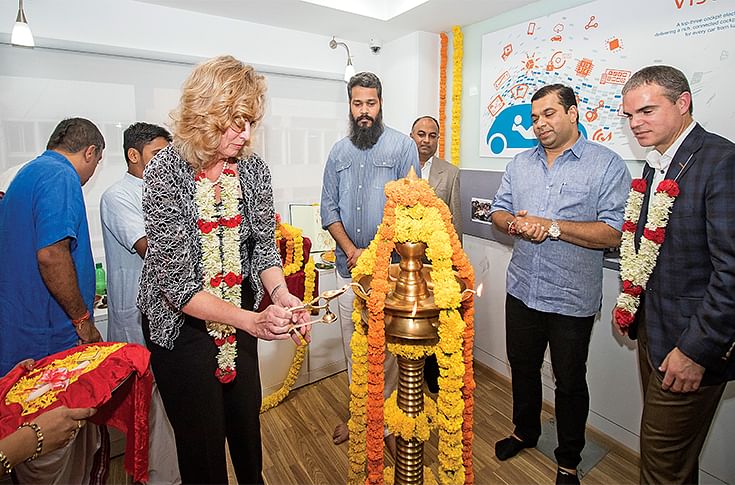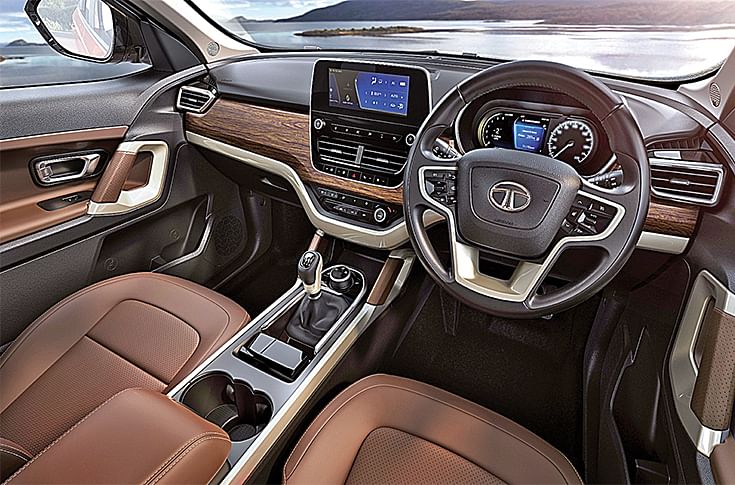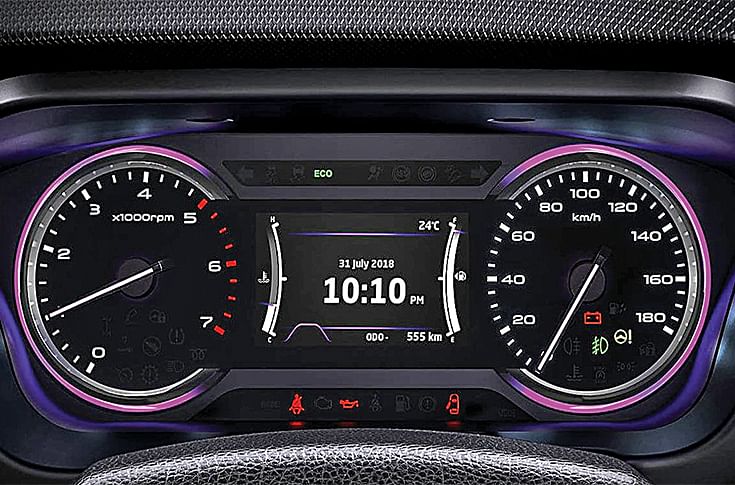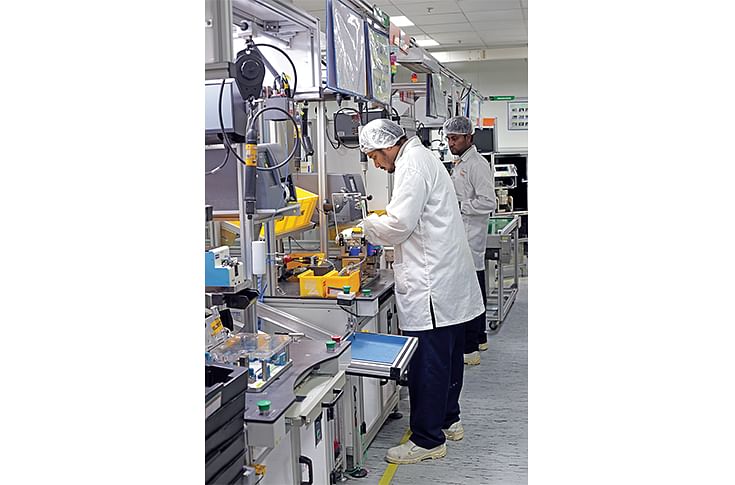Visteon’s Kristin Trecker: ‘The biggest challenge, in India and globally, is acquiring the right talent.'
Visteon’s cockpit electronics business will provide a platform for employees for self-development, and India’s fast-growing role in Visteon’s global scheme of things
Visteon is the sole Tier 1 supplier devoted exclusively to cockpit electronics. Kristin E Trecker, Senior Vice-President and Chief Human Resource Officer, Visteon Corporation, speaks to Autocar Professional's Kiran Bajad on the challenges involved in spotting the right talent, motivating and providing a platform for employees for self-development, and India’s fast-growing role in Visteon’s global scheme of things.
People and human resource management is one of the most critical functions for companies today, across industries. What is Visteon’s mantra for achieving success in this sphere?
Sachin Lawande, our global CEO, is highly passionate about talent and people. He is one of our biggest ‘LinkedIn’ users and does his own recruitment in many ways. The reason he gave me this opportunity in Visteon is that I don’t come with a traditional automotive background. I have spent 16 years at a software company and then at an industrial and medical device company. Sachin always looks at how we bring in passionate people, both in terms of technological prowess and also the diversity in the organisation.

Kristin Trecker lights the traditional lamp to inaugurate Visteon's fourth technical centre in India, in Panjim, Goa on November 1, 2018. The unit will support development of artificial intelligence software, advanced driver awareness systems and deep learning for autonomous vehicles.
After I joined Visteon a little over a year ago, the first thing I noticed is that a lot of decision making was driven by the USA. We needed to be much more regionally focused. I have brought in a new management team, half of whom are based in India. This underlines the importance of our regional hubs, particularly India.
What are the key areas you are working on to address the challenge of hiring the right talent, at a time when the traditional auto industry is undergoing a huge transformation?
We are doing a lot of work around technical skills, machine learning and AI, essentially to try to support this new-age technology development from India. We spent considerable time last year focusing on hiring the right people for these skills. I believe the people we are bringing in are 50 percent due to their skillsets but the remaining 50 percent is due to the cultural fit.
When we hire, our aim is to have people who can do their job but are also interested in moving across, up, over and being retrained. It is also important for us to grow them as well in their career. This is the first goal for us — to hire the right people who can grow with the company.
Secondly, we are still a small organisation and know people by their names. And, lastly, diversity is important in India as elsewhere; we have a big focus on diversity. We are carrying out some activities to increase the number of people from different gender and skills, continuously focusing to ensure we have a diverse workplace.
While Visteon is focusing on empowering regional hubs globally, what is the geographical footprint?
At present, Visteon worldwide has 10,000 employees, of which only 400 are in the USA and between 1,700-1,800 are in India. We also have a big number in China which is a large market for us. The other large centres are Mexico and Bulgaria. We have a big technical centre located globally to support all the OEMs.
To stay future-fit amid disruptive trends like connectivity, ADAS, EVs and autonomous, calls for skilled personnel across the company. Is finding the right people a challenge?
In the automotive industry, once you sell a piece of business, it takes three years before it turns into revenue. The people working in manufacturing are unlikely to work on incoming technology than those working on engineering. One of the things our CEO has done is being highly clear as to how we link our technology roadmap to our customer roadmap, so that they understand where the project is going and we also try to get the talent roadmap.
In the past year, we have done much work towards workforce planning. From a supply and demand of talent point of view, we look at our current projects and shortlist the type of skillsets we need from software and mechanical to determine the number of people needed, when they are required and the area of operation. What’s most important is identifying the gap and getting people at the location of a particular project more proactively. Also, what we are doing from the technology perspective is to support our technical workforce. We are conducting preference assessment in India, an exercise which helps us move people in the areas they really interested in.
Do you have exchange programs where employees are often located in different countries?
We have a lot of movement of people; for instance, our earlier India head of operations has moved to China. Similarly, we have people from other places coming to India. This is what is good about Visteon — there are such opportunities available for employees. Also, as we are opening up new offices in Mexico and Romania, we need to have some of our employees working in India and other locations willing to take their knowledge and develop people at other parts of the world.
You have spent a year at Visteon. How has the experience of working with a global Tier I automotive supplier been? How does it differ from the IT industry, where you worked previously? Are you bringing in some new practices or processes?
The past year was quite interesting. My first observations are that people working in the automotive industry are highly passionate about what they do, no matter which part of the world they are working. They want to contribute, learn, grow and be recognised.

The Tata Harrier SUV sports Visteon's SmartCore cockpit domain controller powering the infotainment system and digital and hybrid instrument cluster.
Coming from a tech company to Visteon, we are in the midst of the technical revolutions like many other industries. There are few things we need to change like the speed of change, not just the technical skills but how we think and operate in wanting to be nimble. Also, here we can attract people from different industries like tech, consumer or electronics.
India is known for its abundant technical skills and engineering talent. How is Visteon trying to tap this? Do you see India’s role growing in Visteon's global R&D?
We have a cluster of HR people that we will continue to grow and build. We are also working on opening a service centre in Chennai to take advantage of the available skillsets in India. I have just hired someone for a global role and based in India because of all the talent based here.
If one of our pilot programmes works well in India, we deploy it to other parts of the world. From the engineering perspective, there are a number of good schools and the number of students coming out of universities is huge. We are expanding our university programs so we can be far more deliberative and attentive to continue building our brand. We also conduct Hackathons to hire talented people.
We see India, with its enormous technical people skills, as not just supporting regionally but also globally. We are extremely fortunate to be present in India since the 1990, more so than the others to take advantage.
How do you attract talent when young graduates prefer to join an OEMs or an IT company? Given the fierce market competition, does a Tier 1 supplier like Visteon find it difficult to get the right people?
Yes, we need to be able to differentiate ourselves. We want people when they step into a car to have the full experience. They should be able to recognise that this is Visteon design cockpit. But we have to figure this out and perhaps do a better job than in the past.
We sell our products to OEMs, so the number of customers are relatively small. One of the things for which we get pretty high marks, no matter where we are, is from our university programs where we have people coming and doing real work. This is what the fresh graduates want to do; if we can continue with that and figure out how do we extend the number of people we bring in then we are on the right track.
How does Visteon keep its workforce motivated and help them grow?
It is always a challenge. It is also cultural with a specific country. We are doing a few things globally. For example, we have 12-month learning management systems which are being implemented. All our employees have an opportunity to go out and look at 2,200 different curriculum covering a broad area of topics, both formal development in a classroom or informal based on everyone’s interest and time. They can choose any topic. This initiative has received quite a positive response for self-development. Secondly, we also have a lot of development on the job itself. As technologies are changing rapidly, we are finding experts so that our people can get connected. We also have a technical ladder under which we are rolling out a career path map for new people using some of the digital tools. Lastly, we have a program called 'Future Makers'. This is an elite program where we look at people who have made a difference in terms of customers, quality and efficiency.

The Marazzo MPV, Mahindra’s most advanced vehicle to date, features advanced cockpit electronics technology from Visteon.
This HR initiative, which is now in its fourth year, helps nominate people globally to become future makers and get special recognition. We are working on a number of things to attract and retain people by giving them what it takes to be happy employees.
Comparing developed markets and emerging economies like India and China, how do you view the talent availability in different geographies for technology companies?
Looking at the sheer volume of talent available, it is going to be higher in places like India and China than other markets. That said, I want to make it clear that it doesn’t mean that the talent is necessarily way better than one of those places than others. India and China certainly have volumes but we need high-quality, capable people no matter where we are located in the world. Also, there are some new emerging technology areas where the talent isn’t available in any country. So we have to find them or, perhaps, train them to get on to a particular project.
Visteon, which recently opened its fourth India tech centre in Goa to work on AI, ADAS and deep learning, plans to fill the majority of its open positions there with graduates from local universities. What is the overall people vision here?
I have been to Goa for the opening up of our new technical centre. We found nearly 20 exciting kids and they are helping us with ADAS. Our CEO Sachin Lawande is a native of Goa, which helps us in terms of preferences. Going ahead, we are going to hire more people in our Goa centre with some of the partnerships inked with the state government and universities.
Do you foresee India playing a larger role in Visteon’s global product developments programs in the near-term?
Certainly. Because some of the Indian OEMs are leapfrogging technologically, they are looking at the same solutions in other developed markets like large displays and other cockpit solutions. Therefore, we need to have a growing presence in India to support some of our local OEMs customers.
With the availability of talent, the leadership and the partnerships we have developed partly because of being in India for over two decades, I see India as a big opportunity for a global company like Visteon. India is continuing to grow for us and we would like to leverage the resources available. India is a key market for us and some of our cluster experts, who are based in Chennai, are working on global projects.
How much does Visteon spend on HR training globally and can you share some salient features on this subject?
I won't able to share any number. Suffice it to say that of all the resources that we have on the global HR side, probably 90 percent of them are working on talent, developing the brand, attracting the right people, developing superior structure, developing future leaders and giving them true benefits. All our dollars are spent on these areas and my role is to specify the areas to focus our resources on so we can make the biggest difference to the company. At the end of the day, the role HR plays is to enable the business.
What are the typical challenges a high-tech company like Visteon faces when it comes to HR, in India and globally?
The biggest one across all the companies is the talent acquisition part. How do we get the right people, those who are passionate about technologies, coming for one job but gradually expanding their horizon? It's all about not losing focus of developing people but helping them bring their best to workplace every day. This is not a simple task but in fact quite daunting. That is why we have to break this down and see what we can do at each location like Pune, Chennai or any other city. We are also looking at gender diversity globally by developing our internship program and a specific recruiting strategy.
Lastly, what are the 2-3 key goals or targets for you in the short term?
The most important goal is to expand our talent acquisition effectiveness from brands, tools, diversity to development, and university tie-up programs. Secondly, the focus on workforce planning is not just identifying where the gaps exist but also marrying the technology to the customer and to the talent road-maps.
(This interview was first published in the July 15, 2019, issue of Autocar Professional)
RELATED ARTICLES
INTERVIEW: "EV Demand is Rebounding both in India and Around the Globe" - JLR's Rajan Amba
Jaguar Land Rover India MD Rajan Amba discusses the India–UK FTA, the company’s manufacturing plans, the upcoming Panapa...
TVS Celebrates 20 Years of Apache, Eyes Premium and Global Push
Marking two decades of its flagship performance brand, TVS Motor unveiled special anniversary editions on Saturday while...
Q&A: Mahindra's Nalinikanth Gollagunta on Upcoming Festive Season, 'Bold' Design Choices
Automotive Division CEO Nalinikanth Gollagunta says mid-teens growth is achievable with Roxx ramp-up, BEVs, and a resil...






 15 Aug 2019
15 Aug 2019
 46316 Views
46316 Views






 Prerna Lidhoo
Prerna Lidhoo


 Darshan Nakhwa
Darshan Nakhwa


